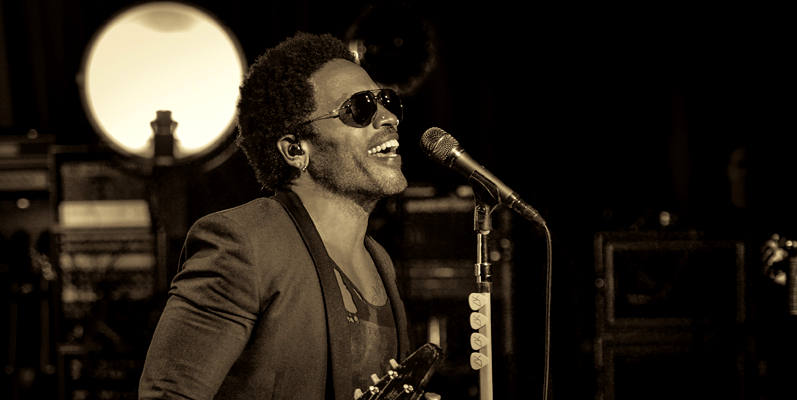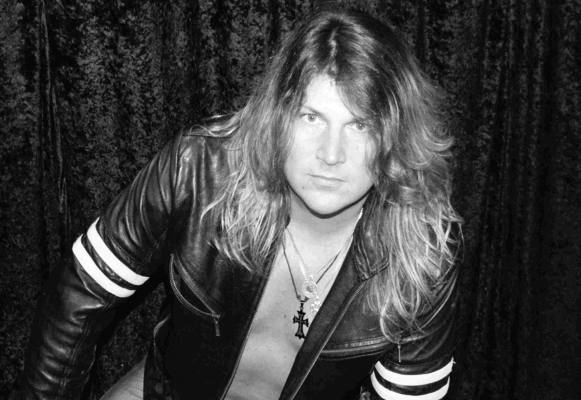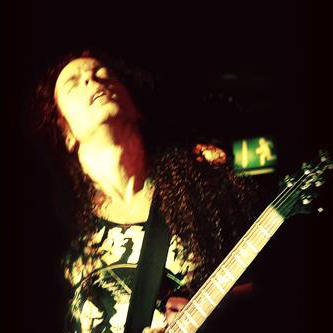
by Alissa Ordabai
– Senior Columnist —
After 13 years of absence from the U.S. music scene, guitar guru Marty Friedman returns to native soil to tour his latest album. Chart-breaker Inferno released by Prosthetic Records a year ago became not only the most acclaimed record of Friedman’s solo career, but also the most lauded instrumental heavy music release of the decade so far.
Features in Rolling Stone, Billboard, and numerous guitar mags praised Inferno’s roiling intensity and the unified feel Friedman gives to the record’s expansive stylistic range. Taking heavy riffing and complex polyrhythms for the album’s foundation, he uses the metal tradition as a trampoline to launch into far-out territories — from unvarnished alternative rock, to East Asian melodies, to weird crossbreeds of thrash and pop. Japan — the country where Friedman settled over a decade ago — continues to stretch his vision further, beyond the genre which made him a superstar as a member of Megadeth all those years ago.
The 21-date tour will take Friedman across the United States, as well as Toronto and Vancouver. But while fans don’t know what to expect from the upcoming shows just yet, we at Hardrock Haven can make a rough guess from having been following Friedman’s live shows for the past 8 years.
While he kept excluding the U.S. from his itinerary, all this time he was paying regular visits to London — stirring up crowds in sweatbox clubs and every time with a different kind of swagger and a different backing band. We saw him accompanied by superb musicians such as Ron Jarzombek, up-and-coming Japanese metal stars, as well as a stellar assortment of young European and Israeli players he would hand-pick as opening acts.
And when it comes to live performance, Friedman does deliver the ultimate best in rock — innovative material coupled with virtuoso execution and A-grade showmanship. The lankiest guitar player on the scene seems to exude more energy than anyone else — think furious headbanging, Townsend-style propeller hand, and all the classic guitar hero moves performed without missing a single note of his fretboard fireworks. Ferocious shows bursting with volatile energy, but delivered with clockwork precision is Friedman’s signature method.
In a way, of all players who are active today, his music charters the development of rock guitar better than anyone else’s — from the peak of the 1980s shred craze to experimental East-meets-West genre-bending ventures. A cultural explorer, a metal god, and a virtuoso, Friedman wears all his mantles with natural ease, making sure rock as a genre not only holds on to its achievements, but develops and expands. So we were naturally excited when an opportunity came our way to interview one of our favorite musicians. A 15-minute chat may not seem that long, but when the interviewee is as focused as Marty, a lot of ground gets covered.
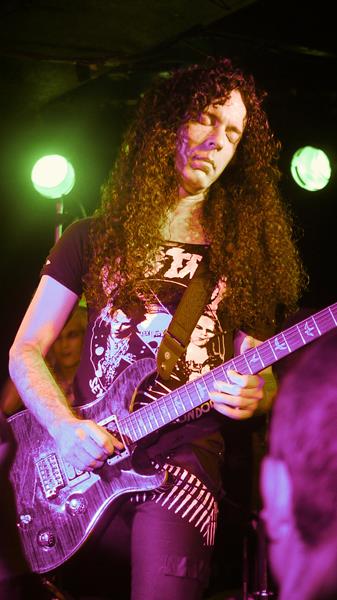 Alissa Ordabai: Marty, thank you for agreeing to do this interview with us, we really appreciate your time!
Alissa Ordabai: Marty, thank you for agreeing to do this interview with us, we really appreciate your time!
Marty Friedman: My pleasure!
AO: And congratulations on presenting your first US tour in over a decade.
MF: Thank you so much!
AO: What inspired you to tour again in the US after such a long break?
MF: Pretty much the same thing that inspired me to do Inferno. It’s been a very natural progression. The record company that released Inferno made me aware of the interest in America in what I was doing, because I was oblivious to the fact. And they made me aware that it’s possible to do a tour. I don’t really know the climate of the US like I probably should — it’s just impossible to keep my finger on every different continent in the world, because I was so locked into what I’ve been doing in Japan. But with everything coming in order really nicely in America there is no time like the present to do it. I couldn’t have been happier, because this is something that I always wanted to do, but it’s never been the type of thing that presented itself in such a way that it looked like it was going to be done properly, so I kind of never given it serious thought. But look what happened — it’s been a very pleasant experience — the response to Inferno has blown my mind so far beyond what I’ve ever expected. I never thought I would get to this point outside of Japan. [Laughter.] So now I am going to make it happen and I am really excited.
AO: At what point did you realize that Inferno was going to become one of the best records of your career?
MF: Well, of course I have that exact same goal every time I go and do anything at all, at least in my own opinion. I can’t control whether other people are going to like what I’m doing or not. If I am going to go into the effort to release anything anywhere, it’s gotta be something that at least I think is by far the best thing I’ve ever done. So, with that in mind, I released Inferno and for some reason, unbeknownst to me, it got a lot of great attention from the mainstream in America. I’ve never ever gotten any attention from Rolling Stone, or grammy.com, or Billboard ever. And they all came out and praised the album big time, and places that would normally ignore me or just be apathetic to me, would come up and say, “This is brilliant.” They would come out of the woodwork for this record and I couldn’t be happier or more surprised. A small part of me wants to say that my other stuff is just as good, but before I even get to that, just be thankful in the first place. Getting some love from the places I would never have expected, it’s all good.
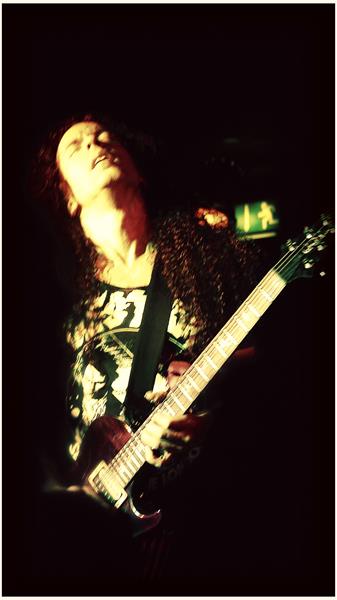 AO: Inferno is such a powerful album. I’m just wondering if the music on this record ever surprise you? Are there moments when you would hit playback and go, “Wow, I didn’t know there was this aspect to my character?”
AO: Inferno is such a powerful album. I’m just wondering if the music on this record ever surprise you? Are there moments when you would hit playback and go, “Wow, I didn’t know there was this aspect to my character?”
MF: You are too kind! [Laughter.] You are too kind to say that. Really, I can only attest that there were great guests on this record. And having their enthusiasm mixed with my enthusiasm must have come up really good together. I don’t know, it’s also possible that this record took maybe twice or three times as long as any other record that I did, so there was a lot of contemplation of everything, making sure that I really loved it before it got finished, so by the time it was done I was sure that at least I was very happy with it. But, again, I do not control what other people like at all. So it’s really just like throwing it out in the air and seeing what sticks, so when people complement it so highly, I can only be very thankful and a little be surprised because my music can be a bit eclectic at times.
AO: The stylistic ground you cover on this album is vast. What kind of audience do you expect to encounter this time in the United States?
MF: That’s a good question because I really have no idea at all. I really don’t have any idea. People pick up my music from so many different places. As long as you like it, I don’t really care why you like it. It’s a funny thing — sometimes a fan would come up to me and say, “I love your music, man, it’s fantastic! You are one of my top two heroes!” And I’m like, “Thanks a lot, what are your other heroes?” And they would name some other guy that I would have no idea why they would put me in the same group as this other person. So there is really no logic to why people pick up on your music. So whatever the reason is, I’m happy. Some people really find themselves a fan of my ballads, and I can’t imagine that those people would also get off on my really heavier music as well. So I am kind of doing myself a disservice by putting both of that on the same album. I happen to like all of them equally. But I can’t really control what anybody likes, so I have absolutely no idea if anybody is going to show up and what kind of fans will show up. But I can just tell you that it’s going to be the absolute best shows that I can put on, with the most enthusiasm, because it’s new to me — I’ve never really done a solo tour of America. I have a ton of material to choose from, and an unbelievable band that is going to outshine me at every turn. Either way I’m just going to enjoy the tour. But to answer your question, I have no idea what kind of people to expect.
AO: In terms of the set list, apart from focusing on Inferno, what other material are you including?
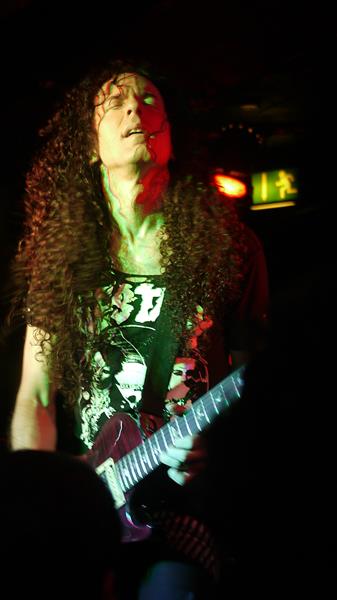 MF: Well, I’ve got 12 albums of stuff that I’ve done just as Marty Friedman. So, of course, that’s going to be the main focus. The songs are going to have to be stuff that translates live and stuff that makes my band look good, and stuff that gets the audience involved. And there is going to be a lot of stuff that is not necessarily just playing the songs as they are on the CD, but getting more than you would expect from, say, an instrumental guitarist. Because when I hear those words “instrumental guitar,” that makes me want to run for the refreshment counter. So whatever I can do to make the show something that the audience feels involved in, and not like they are just watching a guitarist show what he can do on the guitar. Any point where I can get that into it… And there are a lot of points in the show that are like that. A lot of it is stuff that I’ve learned from playing with the biggest mainstream acts in the world in Asia. With them I’d pick up things that you don’t usually find in a metal show, or in a show that has a lot of intense guitar playing in it. So I picked up a lot of things from strange places that will hopefully translate into an enjoyable night for everybody.
MF: Well, I’ve got 12 albums of stuff that I’ve done just as Marty Friedman. So, of course, that’s going to be the main focus. The songs are going to have to be stuff that translates live and stuff that makes my band look good, and stuff that gets the audience involved. And there is going to be a lot of stuff that is not necessarily just playing the songs as they are on the CD, but getting more than you would expect from, say, an instrumental guitarist. Because when I hear those words “instrumental guitar,” that makes me want to run for the refreshment counter. So whatever I can do to make the show something that the audience feels involved in, and not like they are just watching a guitarist show what he can do on the guitar. Any point where I can get that into it… And there are a lot of points in the show that are like that. A lot of it is stuff that I’ve learned from playing with the biggest mainstream acts in the world in Asia. With them I’d pick up things that you don’t usually find in a metal show, or in a show that has a lot of intense guitar playing in it. So I picked up a lot of things from strange places that will hopefully translate into an enjoyable night for everybody.
AO: How much improvisation should people expect to hear at these shows?
MF: A ton!
AO: Right!
MF: There is going to be a lot of sections where we just go apeshit. And things that will only happen in that particular night. I can do some pretty crazy stuff — dragging people from out of the audience to jam. I’m not going to do that necessarily every night or anything, but sometimes I can get caught up in the moment and crazy things can happen. That’s just keeping it fun for me, and there is definitely going to be a lot of improvisation in the playing. There is certainly room for improvisation in music. A lot of it was improvised in the first place, especially on albums like Inferno and a lot of my Tokyo Jukebox stuff. Improvisation is already inherent in the music.
AO: That leads me to a goofy question. What is the best way to get your attention at a show?
MF: Wow, that’s a good idea! I’m like one of these guys who even as a kid wanted to make eye contact with as many people as possible during a show. There are good reasons for that. One is that you look better when you are not looking at your instrument. [Chuckle.] So if somebody takes a picture, you look better than when nobody can see your face. So you look better if you are looking out there. And it just gives you something to feed off. Sometimes when an audience member catches you looking at them, there is just energy that comes off of them that you can’t deny, it just comes into it and gives you more energy to play. So any extra energy I can receive, I’m really into it. And it kind of gauges how you do it too. If you look at their face and they are excited, it kind of gauges how the show goes. I always try to get eye contact with as many people as possible. A lot of venues on this tour are not that big, so I can get up close and personal with a lot of people. So I’m looking at you — let’s put it that way. It should’t be that hard to get my attention.
AO: What things — to your mind — have to coincide for a great show to happen?
MF: Well, first and foremost, you have to play really, really well. That’s the most important thing to me. A good show will never happen by people playing shitty. So it has to be played really well. And sometimes it’s something that is undefinable. Something that possibly happened only in that one city and that one day, maybe something that inspires you to play a song that wasn’t on the set list — something that is not ready to be broken out, but you play it and it goes great. Or just a moment. Sometimes it feels like you are having a moment with these people. It’s really hard to explain but you know when it’s done, you know when it’s been an exceptional show or when it’s just been a good show — you made it through the songs, everything was fine, but when it’s exceptional you get this goose bump thing and hopefully we will get near that every night.
AO: How do you manage on the one hand to maintain your amazing chops and at the same time be a composer and a songwriter? Are there enough hours in the day to maintain all of these skills?
MF: I don’t think that the answer to your question is in maintaining. The answer is in stretching them out. As long as you continue to do work that is challenging that is not what people expect of you. If you do that all the time and make a habit of it, not only do you maintain, but you grow in a huge way. It’s natural for me. It’s something that I forced myself to do ever since I was a kid. But to this day I am constantly doing this. Quick example: last week I did two shows in Japan with a group called DCPRG which is probably by far the most difficult music I’ve ever tried to play for anybody, and I did two shows with them. The prep for that and the actual shows was just such a brain extender that it’s already influenced the next music that I’m writing myself, just from things that I’ve learned from them. And why it is so difficult? It’s not the stuff that I would normally listen to, as it is very progressive. It has odd timings — that I’m cool with — but odd timings played all in polyrhythms. I’m cool with polyrhythms and I’m cool with odd timings, but I’ve never ever done an entire set with both together at the same time. So musically it was completely insane and very, very difficult. And I’m sure I did a pretty poor job of it. I did my best, and even the little parts that I did get well, that already influenced the next thing that I’ve written. So it’s one grain of sand at a time, but doing things that I would normally say, “Fuck that, it’s too difficult, I don’t want to do that!” Making sure that you always accept those challenges and don’t turn them down — that’s the secret. That’s what I’ve done forever and it makes things good.
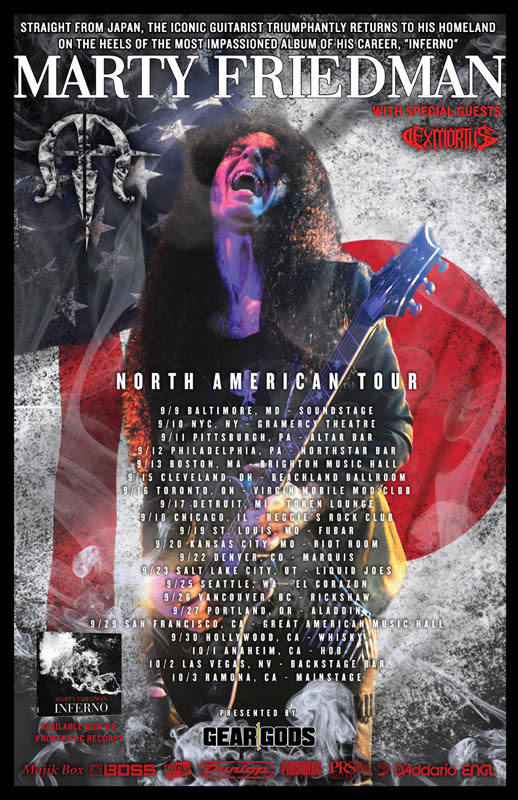
Visit Marty online: http://www.martyfriedman.com/


